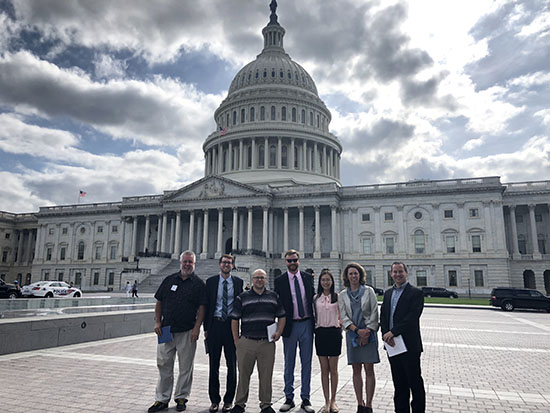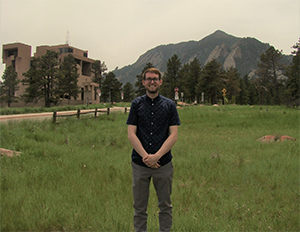Standing Up for Science
 |
|
Josh Alland (one from left) visited Capitol Hill last month to advocate for basic science research. |
ALBANY, N.Y. (July 11, 2018) – Led by monster storms Harvey, Irma and Maria, the 2017 Atlantic hurricane season was one of the most destructive on record, killing hundreds of people and costing the United States more than $200 billion in damage.
Those numbers served as motivation for Josh Alland as he visited Capitol Hill last month.
Alland, a 6th year Ph.D. student in the Department of Atmospheric and Environmental Sciences (DAES), joined leaders from the University Corporation for Atmospheric Research (UCAR) in Washington, D.C. to advocate for basic science research funding. While in our nation’s capital, he met with congressional staff from both parties – including the office of Paul Tonko who represents New York’s Capital Region.
Six undergraduate and graduate students were selected for the trip after each submitting a 500-word essay that discussed the importance of atmospheric and related science research.
“Effects of climate change, such as sea level rise, shifting climate zones, and more frequent and intense extreme weather events, degrade living conditions, human security, human health, and threaten the stability of countries around the globe,” said Alland in his essay submission.
“The U.S. must take the tougher, offensive approach to policymaking by funding atmospheric science-related research, development, and innovation.”
 |
|
Alland is a visiting graduate student this summer at the National Center for Atmospheric Research in Boulder, Colo.
|
Bipartisan Support:
At UAlbany, Alland is working under DAES Associate Professor Kristen Corbosiero and Assistant Professor Brian Tang to better understand and improve hurricane intensification forecasts. His research is supported by the National Science Foundation (NSF) and National Center for Atmospheric Research.
Alland linked his own research to the nation’s economic security, health and nation security when sitting down with congressional staffers in Washington, D.C.
“UCAR believes that engaging young scientists early in communicating their work to decision-makers is an important part of their preparation. Further students have demonstrated to be very effective – they usually get most of the attention during these visits,” said Everette Joseph, director of UAlbany’s Atmospheric Science Research Center and chair of the UCAR Board of Trustees.
Despite threats from the White House to slash science funding, the final 2018 U.S. spending bill gave a last-minute reprieve to NSF, increasing its budget by 4 percent to $7.767 billion. Science Magazine reports that the federal science agency could be in line for another 4 to 5 percent increase next year.
“No matter who your constituents are, everyone can relate to weather and its critical importance to our future. I left our meetings feeling confident that funding for basic science research has bipartisan support,” Alland said.
“The atmospheric science community is very appreciative to congress for the support it provided in the fiscal year 2018 budget,” added Joseph. “Optimism continues for the 2019 budget given the strong economy and the continuation of that support.”
Preparing Next Generation Scientists:
UAlbany’s Department of Atmospheric and Environment Sciences and Atmospheric Science Research Center combine for the largest concentration of atmospheric, climate and environmental scientists in New York State, and one of the largest in the nation, with close to 120 faculty, researchers and staff. The University’s 75 atmospheric science graduate students are also amongst the largest group in the country.
Alland is on track to graduate next May. He’s considering a return to Capitol Hill as a science policy fellow.
“I’ve had a tremendous experience at UAlbany,” Alland said. “The department has some of the top minds in our field, who have prepared me to help address today’s issues in science and the ones awaiting us in the future.”
![]() For more news, subscribe to UAlbany's RSS headline feeds
For more news, subscribe to UAlbany's RSS headline feeds
A comprehensive public research university, the University at Albany-SUNY offers more than 120 undergraduate majors and minors and 125 master's, doctoral and graduate certificate programs. UAlbany is a leader among all New York State colleges and universities in such diverse fields as atmospheric and environmental sciences, business, education, public health,health sciences, criminal justice, emergency preparedness, engineering and applied sciences, informatics, public administration, social welfare and sociology, taught by an extensive roster of faculty experts. It also offers expanded academic and research opportunities for students through an affiliation with Albany Law School. With a curriculum enhanced by 600 study-abroad opportunities, UAlbany launches great careers.


